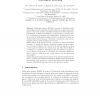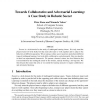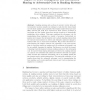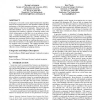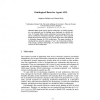132 search results - page 13 / 27 » Adversarial Behavior in Multi-agent Systems |
LAMAS
2005
Springer
14 years 2 months ago
2005
Springer
Abstract Multi-agent systems (MASs) is an area of distributed artificial intelligence that emphasizes the joint behaviors of agents with some degree of autonomy and the complexiti...
IJMMS
1998
13 years 8 months ago
1998
Soccer is a rich domain for the study of multiagent learning issues. Not only must the players learn low-level skills, but they must also learn to work together and to adapt to th...
IFIPTM
2010
13 years 7 months ago
2010
Ranking systems such as those in product review sites and recommender systems usually use ratings to rank favorite items based on both their quality and popularity. Since higher ra...
ATAL
2009
Springer
14 years 3 months ago
2009
Springer
In this paper, we describe a nature-inspired optimization algorithm based on bee foraging behavior. This algorithm combines the high performance of bee path-integration navigation...
CAISE
2003
Springer
14 years 1 months ago
2003
Springer
Abstract. Multi-Agent Systems (MAS) architectures are gaining popularity over traditional ones for building open, distributed or evolving software. To formally define system archit...
